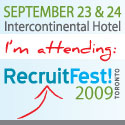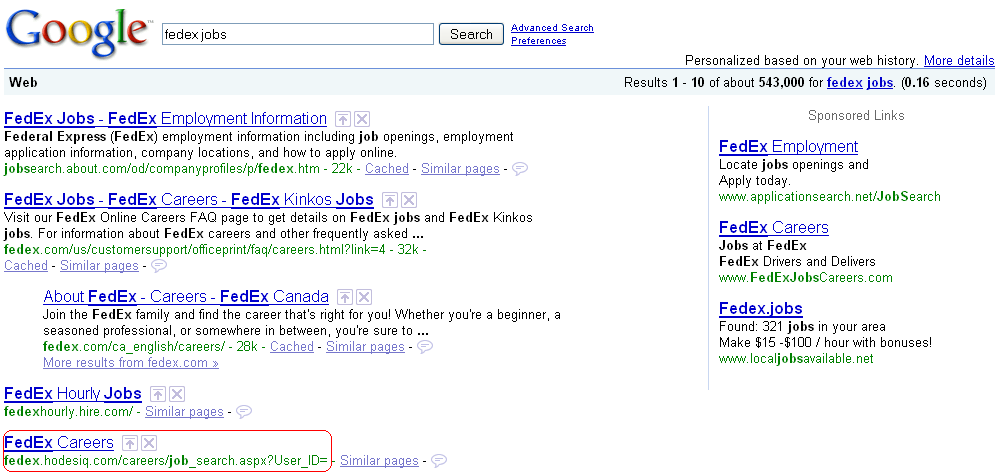I was not planning to write another post on online application processes and Applicant Tracking Systems, but yesterday a post by Laurie Ruettimann at PunkRockHR (and the ensuing comments) on applicant frustration with online corporate application processes I thought calls for a more lengthy comment than I cared to place on PunkRockHR.
Besides, I did not want to cloud up the lively debate going on about which place was worse to work for Taco Bell or Del Taco.  Flickr - Majiscup - Drink for Design
Flickr - Majiscup - Drink for Design
The gist of the issue is candidate frustration with the tedious online application processes of most companies, and the fact that in a wide-ranging job search, the job-seeker is frustrated entering more or less the same information over and over again (in slightly different formats) on numerous corporate job sites.
Laurie expressed the desire for a sort of 'universal candidate profile' that job-seekers could set up once, and leverage throughout most online application processes, perhaps using Facebook Connect or LinkedIn in some fashion for authentication.
It is a great concept, and I'd like to offer a few reasons why a 'universal profile' does not yet exist. By the way, I do know about ResumePal, which does appear to have most of the features that were discussed, but has not really gained much headway in the market.
Barriers to the Universal Candidate Profile
1. It already exists, it's called LinkedIn
LinkedIn has about 21 Million US based profiles. How could a new 'Universal Profile' platform get very far competing with what LinkedIn already offers job seekers. Free access, ability to connect with thousands of recruiters and HR professionals, (the Boolean Black Belt says 5% of all US profiles are recruiters or HR), networking with affinity groups, and lots of job opportunities listed throughout. Every recruiter I know uses LinkedIn to source and research candidates. I am not saying LinkedIn is perfect, or even easy for a less tech-savvy candidate to navigate, but it has enormous size and influence certainly scaring off potential competitors.
LinkedIn certainly has the muscle to get behind initiatives to build out its profile to support more of the concepts of the Universal Profile, but that may not really be in their strategic plans. One commented on the PunkRockHR post correctly pointed out the ATS vendor JobVite does allow candidates to include their LinkedIn profile on their job application, but that is only a benefit if you are lucky enought to be applying for a job with a JobVite customer. And, the company still will typically require a resume, cover letter and other fields above and beyond the LinkedIn profile.
2. Attracting enough candidates to a new Universal Profile
Face it we are all pretty much overwhelmed with online accounts, networks, user names and passwords. Without an incredibly compelling argument, (one click to find a job listing, two clicks to apply to any company), a new Universal Profile System is going to have major problems attracting enough candidates to survive. No candidate will want to invest much time and energy creating and maintaining another online profile without a realistic expectation of some unique benefits.
3. Integration with corporate Applicant Tracking Systems
This may be the single largest barrier to widespread adoption of a Universal Candidate Profile. There may be 150 - 200 different ATS on the market. Granted, the Fortune 1000 probably cluster around the largest 10 or so vendors (Taleo, PeopleSoft, SAP, Kenexa, Oracle, etc.), but realistically a small percentage of job seekers target only super large firms. As Meg Bear pointed out in a comment to the original post, HR-XML standards have been developed to facilitate this process, but for numerous reasons have not really gained much momentum in this area.
Corporate ATS range from really, really simple and straightforward, to incredibly complex. Developing a standard methodology to allow all these disparate ATS to connect to the Universal Profile and have the Profile automatically populate the necessary information on the Corporate ATS is a daunting proposition. Again, ResumePal seeks to solve this, but as yet has not seemed to grab the attention of the market.
4. Corporate Motivation
This is closely related to Reason 3. Essentially, the vast majority of corporations would not place 'Modify or upgrade the ATS to support the Universal Profile' very high on a list of HR Technology initiatives. In a labor market where applicants for most positions are plentiful, many HR, recruiters, and hiring managers are already drowning in resumes. Projects that can be partially interpreted as leading to even more applications, are not likely to be well received in corporations. In fact, I have heard more than a few hiring managers profess that they like to keep the online application process cumbersome, as applicants that 'stick it out' and complete the process demonstrate some level of commitment or desire to want to work for the company. In a way, the difficult application process is the first (and sometimes only) pre-screening that takes place. Until the economy improves, I would not expect corporations to be all that interested in the Universal Profile.
5. Compliance Reporting
This may seem like a minor issue, (and one that candidates certainly don't care about), but almost all US companies have strict EEO and affirmative action related compliance reports that must be fild periodically. Applications that flow from the Universal Profile to the corporate ATS would likely to be augmented or enhanced in some manner to facilitate the preparation of these reports. And that is not really something candidates would want to do, they have already completed the profile, they would be unlikely to then go to the ATS to fill in yet more data.
These are just a few of the reasons that came to mind today when reading the original post and comments.
I will have to write a follow-up post that attempts to describe what I think might be a better way forward for applicants and corporations alike, but honestly with the complexity and sheer number of ATS on the market, and the above described corporate barriers, there are no simple answers.
Do you have any ideas to improve the experience at the macro level for applicants and corporations?


 Steve
Steve

